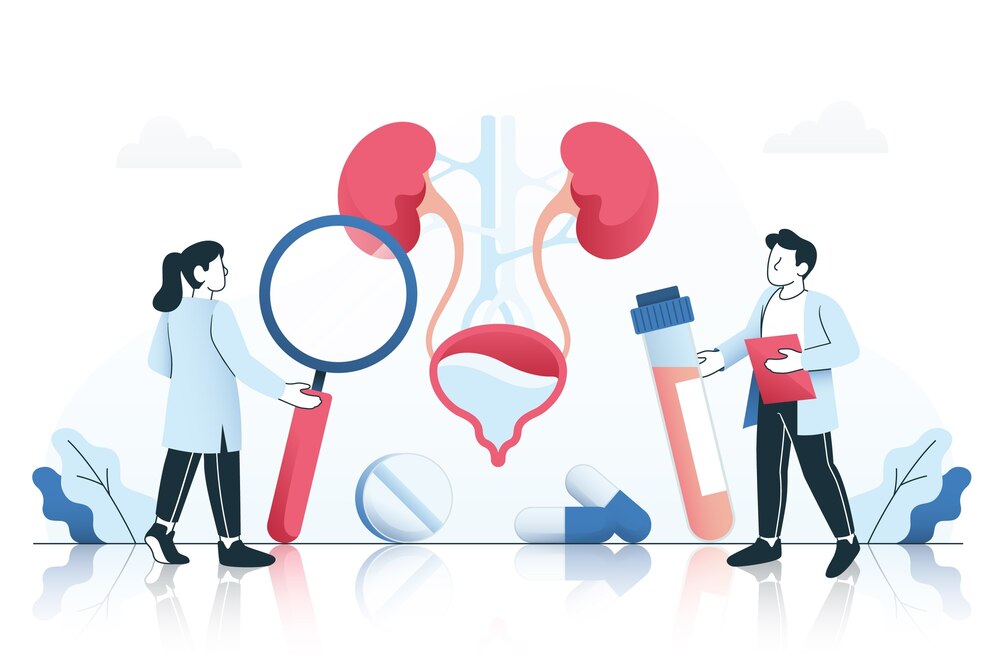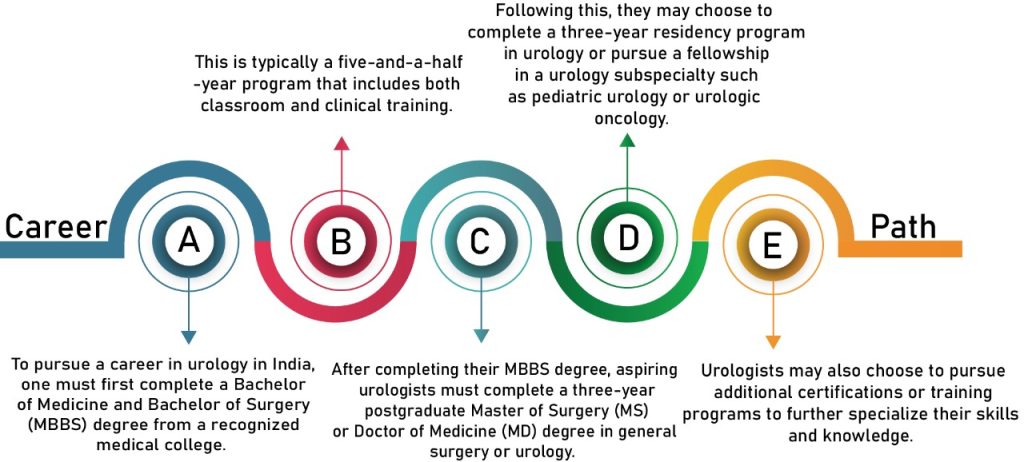Urology is a medical specialty that focuses on the diagnosis and treatment of conditions related to the urinary system and male reproductive system. Urologists are trained to treat a wide range of conditions, including urinary tract infections, kidney stones, prostate cancer, and infertility. They use various diagnostic tools, such as ultrasound and cystoscopy, to assess the condition of the urinary and reproductive systems. Treatment options may include medication, minimally invasive procedures, and surgery. Urologists work closely with other healthcare professionals to provide comprehensive care to their patients.

Work description
Urologist’s work typically involves performing physical exams, reviewing patients’ medical histories, and using diagnostic tests to evaluate the function and health of the urinary and reproductive systems.
Urologists may also perform surgical procedures to treat conditions such as kidney stones, urinary tract infections, and cancers of the bladder, prostate, or testicles.
In addition, they may work with patients who have infertility issues, helping them to identify and manage underlying conditions that may be affecting their fertility.
Urologists also work closely with other healthcare professionals, such as oncologists, radiologists, and primary care physicians, to provide comprehensive care to their patients.
High Demand
Urology is a rapidly evolving and expanding field, with new treatments and technologies being developed all the time.
Lucrative salaries
Urologists have the opportunity to make a real difference in their patients’ lives by diagnosing and treating conditions that can have a significant impact on quality of life.
Opportunities for innovation
The field of urology offers a wide range of subspecialties, such as pediatric urology, female urology, and urologic oncology, which allows for a high degree of specialization and the ability to focus on particular areas of interest.
Versatility
Urologists typically enjoy a high level of job security and good earning potential, with salaries averaging around $400,000 per year in the United States.
Flexibility
Urologists have the opportunity to work in a variety of settings, including hospitals, clinics, private practices, and research institutions.
Job satisfaction
The potential to specialize in areas such as sustainable design, structural engineering, or building systems design.
High stress
Urology is a highly demanding and competitive field, requiring many years of education and training.
Long hours
The work can be emotionally and physically challenging, as urologists often deal with patients who are experiencing significant pain, discomfort, or distress.
Competitive field
Urologists may face high levels of stress and pressure due to the nature of their work and the need to make critical decisions quickly.
Constant learning
The field of urology is rapidly evolving, which means that urologists must continually update their skills and knowledge in order to stay up-to-date with the latest treatments and technologies.
Isolation
Like other medical professions, urology carries the risk of exposure to infectious diseases and workplace injuries.
Eye strain and other physical health issues
The potential for competition for jobs, particularly in areas with high demand for architectural engineering services.
The cost of pursuing a career in urology in India can vary depending on several factors, including the type of institution and program chosen, the location, and the duration of the program. In general, pursuing a career in urology in India can be quite expensive, with costs ranging from several lakhs to crores of Indian rupees. The cost of medical school alone can range from 10 to 50 lakhs, while post-graduate training programs can cost upwards of 25 lakhs or more. Additional expenses may include living costs, textbooks and equipment, exam fees, and travel expenses. Scholarships and financial aid may be available to help offset some of these costs, but competition for these resources can be intense.
[wpcharts type=”horizontalbarchart” bgcolor=”red:gray:yellow,blue:gray:yellow,random:gray:yellow,purple:gray:yellow” min=”0″ legend=”true” titles=”2 year , 5 year” values=”3,7,5,12″]
The earning potential of a urologist in India can vary depending on several factors, including their level of experience, specialization, location, and type of practice. In general, urologists in India can earn anywhere from several lakhs to crores of Indian rupees per year.
The average annual salary for a urologist in India is around 1.5 crores, with salaries ranging from 30 lakhs to 5 crores or more depending on factors such as experience and location. The entry level salary is between 1-1.2 lakh per month which can be increased to 10-15 lakhs per month with experience.
Urologists who work in private practice or in high-demand areas such as metropolitan cities tend to earn more than those who work in public hospitals or rural areas. However, urology is generally considered to be a high-paying medical specialty in India, with significant earning potential for those who are successful in their careers.
[wpcharts type=”horizontalbarchart” bgcolor=”red:gray:yellow,blue:gray:yellow,random:gray:yellow,purple:gray:yellow” min=”0″ legend=”false” titles=”Entry-Level, Mid-Career, Senior-Level ” values=”5,15,25,35,45,55″]
Strong academic background in science and mathematics.
Good problem-solving and critical thinking skills.
Good communication skills and the ability to explain complex medical information to patients and their families.
Attention to detail and the ability to perform precise surgical procedures.
Strong work ethic and the ability to work long and irregular hours.
- Emotional resilience and the ability to handle high-pressure situations.
Interest and passion for the field of urology.
Strong work ethic and the ability to work long and irregular hours.
Poor hand-eye coordination and motor skills, which are essential for performing surgical procedures
Lack of attention to detail and the tendency to make careless mistakes.
Difficulty in working under pressure or handling emotionally challenging situations.
Lack of interest or passion for the field of urology.
- Lack of dedication and commitment to ongoing education and training in the field.
A lack of attention to detail, which can lead to errors and safety issues in designs.
Work-life balance
The work-life balance of a urologist can be challenging, as the demands of the job can be high and unpredictable. Urologists may work long hours, including nights, weekends, and holidays, and may be called in for emergency procedures or consultations.
However, they may also choose to work in settings that offer more flexible schedules or work-life balance support, such as academic medical centers or group practices with a team-based approach to patient care.
To maintain a healthy work-life balance, urologists may need to prioritize self-care and make time for hobbies, exercise, and social activities outside of work.

As a urologist, you can make a significant impact on patients’ quality of life by treating conditions such as urinary incontinence, kidney stones, and prostate cancer.
Urologists may perform surgery and other procedures to help patients with urinary or reproductive issues, such as vasectomies, prostate biopsies, and robotic-assisted surgery for prostate cancer.
Urologists often work closely with other medical professionals, such as oncologists and radiologists, to coordinate care for patients with complex medical conditions.
The demand for urologists is growing as the population ages, and urological conditions become more prevalent.
The demand for urologists is growing as the population ages, and urological conditions become more prevalent.
Architectural engineers can contribute to disaster resilience by designing buildings and infrastructure that are resilient to natural disasters such as earthquakes, floods, and hurricanes.
Pediatric Urology
Specialized in treating urinary tract and genital problems in children
Female Urology
Specialized in treating urinary tract and pelvic floor problems in women, such as urinary incontinence and pelvic organ prolapse
Urologic Oncology
Specialized in the treatment of cancers of the urinary tract, including bladder, kidney, and prostate cancer
Reconstructive Urology
Specialized in reconstructing the urinary tract or genitalia due to congenital abnormalities, injury, or cancer treatment
Male Infertility
Specialized in diagnosing and treating male infertility, including problems with sperm production, delivery, and function
Conclusion:
In conclusion, urology is a rewarding and challenging medical specialty that offers opportunities for professional growth and innovation. As a urologist, you can make a significant impact on patients’ quality of life by treating a wide range of conditions affecting the urinary tract and male reproductive system. There are also various subspecialties within urology, allowing for further specialization and expertise. With a growing demand for urologists and an increasing prevalence of urological conditions, a career in urology can offer a fulfilling and satisfying career path for aspiring medical professionals.



